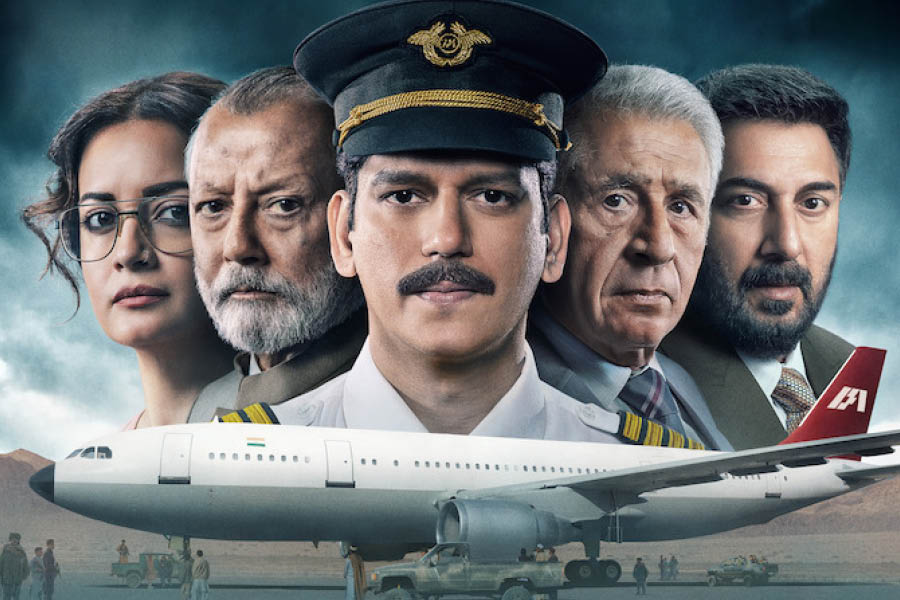For his OTT directorial debut, filmmaker Anubhav Sinha has lined up a galaxy of seasoned actors and made IC 814: The Kandahar Hijack — streaming on Netflix — worth every bit of it. Featuring Vijay Varma, Naseeruddin Shah and Pankaj Kapur in the lead, the series is an adaptation of the book Flight Into Fear by Captain Devi Sharan and Srinjoy Chowdhury, which revisits the week-long ordeal in December 1999 of the passengers and crew of the hijacked Indian Airlines Flight IC 814.
The true story of Flight IC 814
On December 24, 1999, a New Delhi-bound Indian Airlines flight from Kathmandu was hijacked by a group of terrorists backed by Al Qaeda and the Taliban. The Indian government’s response to the hijacking was marked by delays and internal conflicts, before eventually conceding to the demands of the hijackers to release three terrorists in exchange for the lives of all those on board.
The hijacking and the long-drawn process for resolution unfolded across multiple airports, from Kathmandu to Kandahar via Amritsar, Lahore and Dubai, with each location adding a layer of tension and uncertainty. It took seven days for everyone to be freed, making this incident a case study in crisis mismanagement.
Anubhav Sinha hits the nail on the head
Over six episodes, Sinha captures the chaotic trajectory that flight IC 814 took with the passengers and crew as hostages, and the emotional and psychological scars that continue to haunt the survivors 25 years later.
The narrative structure of IC 814: The Kandahar Hijack oscillates between the claustrophobic confines of the hijacked plane and the high-pressure rooms in the power corridor of New Delhi. On the one hand are all those on board enduring unspeakable conditions — clogged toilets, stifling heat, lack of food — under the constant fear of the hijackers brandishing weapons. On the other are the tense huddle of government officials and intelligence agencies scrambling to find an appropriate way to respond.
This dual perspective is one of the strengths of the show, allowing it to explore the complexities of the situation from multiple angles. The mounting anxiety is palpable, whether in the cramped quarters of the Airbus where tempers flare among the hijackers, or in the corridors of power, where decisions are made — or avoided — in an atmosphere thick with adrenaline and uncertainty.
The series also takes an unflinching look at the political context of the time. The year was 1999, and the central government, led by Prime Minister Atal Bihari Vajpayee and External Affairs Minister Jaswant Singh, was faced with the unenviable task of negotiating with terrorists supported by Al-Qaeda. The Taliban, then in power in Afghanistan (the plane was finally stranded in Kandahar), was a thorn in the flesh as India did not officially recognise their government. Sinha deftly handles the treatment of this political landscape, showing how the push-and-pull dynamic panned out before the government could arrive at the decision to release three high-profile terrorists in exchange for the hostages.
An incredible ensemble cast
At the heart of Sinha’s debut web series is Vijay Varma, who plays Captain Devi Sharan, the pilot whose cool-headedness and quiet courage was instrumental in ensuring the safety of the passengers.
With a pistol pressed against his neck for hours and tasked with the responsibility of keeping his crew and passengers calm in the face of escalating threats, Varma strikes a fine balance between conflicting emotions that anchors the show. If Captain Sharan held the reins of the hijacked plane, Varma does the same for IC 814: The Kandahar Hijack.
The two veteran actors, Naseeruddin Shah as the PM’s advisor Vinay Mishra and Pankaj Kapur as External Affairs Minister Vijaybhan Singh, go neck and neck in bringing forth the moral and ethical dilemmas faced by those in power. Their interactions, though prolonged at times, make the story richer. Arvind Swami, Kumud Mishra, Manoj Pahwa and Dibyendu Bhattacharya round out the ensemble cast as members of various branches of the government who lead the negotiations with the hijackers. Their actions highlight the bureaucratic inertia and infighting between agencies that contributed to the prolonged crisis.
The series also touches upon the role the media played in shaping public perception of the crisis, through two journalists played by Dia Mirza and Amrita Puri. These women underscore the ethical tightrope that journalists must walk during such high-stakes events — how much information to reveal to the public and how much to withhold to avoid fueling hysteria.
Alongside the resilience of the passengers, the show focuses on the heroic efforts of two air hostesses, played by Patralekhaa and Aditi Gupta Chopra, who keep everyone calm in the face of imminent death.
Visually, IC 814: The Kandahar Hijack is a well-shot series. The production design is top-notch, with careful attention to detail. What sets it apart from films and shows on similar themes is its consistent focus on the human element of the crisis and its grounded approach. Sinha intercuts the screenplay with archival footage of the real-life hijack and its aftermath, giving it a documentary feel.
The only peeve point is the pacing in the first four episodes which often drag. The series might have benefitted from a sharper overall tone too. Yet that is a minor complaint and one has to tip one’s hat to Sinha for his plainspeak, given the present political scenario. But pulling no punches is what one expects from Sinha anyway.










